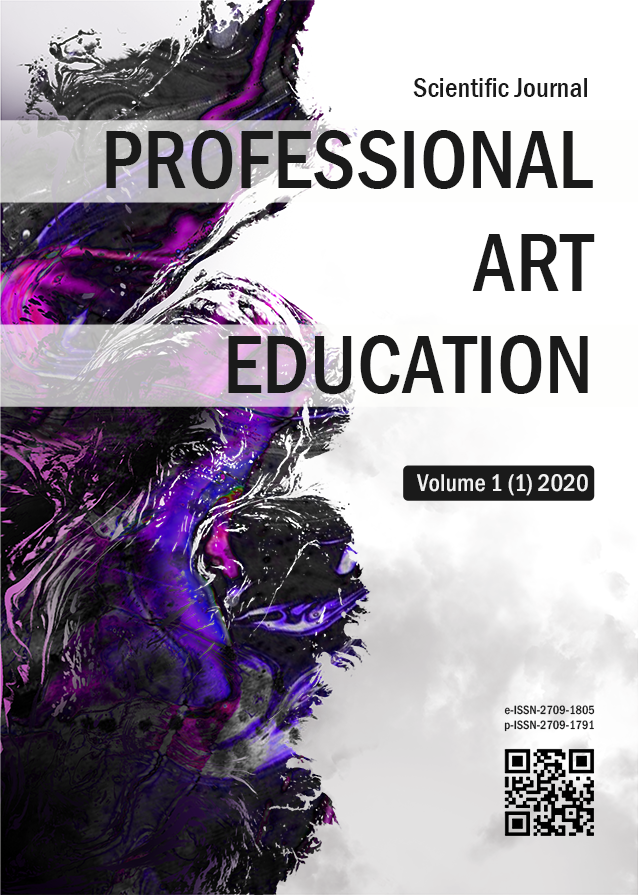Study of Scientific Research Culture of Future Music Teachers in European Countries
DOI:
https://doi.org/10.34142/27091805.2020.1.01.04Keywords:
European educational space, research culture of a music teache, research-oriented learning, interdisciplinary thinking, music-pedagogical education, continuing educationAbstract
Object. In the article taking into account forming of European educational space orientated on rapprochement of the systems of training of pedagogical personnels in the countries of european union, actuality of the research-oriented studies as innovative is grounded. Methods. On the basis of comparativist analysis the different vectors of refraction of theoretical and practical experience
are considered in relation to forming of scientifically-research culture of teachers, future teachers of musical art, in European countries (To Germany, Poland, Great Britain). Results. It was found that in the European pedagogical space there is a significant number of teacher training programs «teacher-scientist», «teacher-researcher», «teacher who reflexively self-governs», «teacher - reflexive practice». In these programs, the conditions for organizing the training of future teachers, the nature of educational interaction are transformed and subject to the requirements of research. The German pedagogical system is based on W.Humboldt’s concept of higher education and determines that the specialty «music teacher» is based on three «whales» - creativity, science and pedagogy. It is established that in Poland the master’s research is considered as a didactic category in art education and requires different ways of organizing scientific and pedagogical guidance; in the Great Britain, the education and development of a teacher-researcher, a thinking practitioner, is a personal marker of his competence and professionalism. Conclusions. Factors influencing the development of critical, interdisciplinary, analytical, methodological thinking of the future specialist and creating the necessary foundation for the formation of his research culture are identified. This is raising the level of scientific and methodological education, the fundamentalization of the educational space, its «learning», the intensification of research, reflection, innovative forms of learning.
Downloads
References
Катревич, Л. В. (2015). Сучасні тенденції та зміст професійної підготовки вчителів гуманітарних дисциплін у вищих закладах освіти Великої Британії. Режим доступу: http://nbuv. gov. ua/UJRN/Vnadped_2015_4_9
Ніколаї, Г. Ю. (2007). Музично-педагогічна освіта в Польщі: історія та сучасність: Монографія. Сумський Сдержавинй педагогічний університет імені А. С. Макаренка. Суми: СумДПУ, 395 с.
Синенко, С. І. (2002). Розвиток післядипломної педагогічної освіти в країнах Західної Європи (Англія, Франція, Німеччина): Автореферат дис. … канд. пед. наук: 13. 00. 04. Центральний інститут післядипломної педагогічної совіти АПН України, Київ, 20 с.
Ратнер, Ф., Матушевская, Г. (2012). Подготовка учителей за рубежом: монография. Казань: Издательство Казанского университета, 114 с.
Тушева В. В. (2015). Формування науково-дослідницької культури майбутнього вчителя музики в процесі професійної підготовки: теорія і практика: Монографія. УМО НАПН України. Харків: Майдан, 450 c.
Vitkauskas R., Rinkevičius Z. (2007). Būsimųjų muzikos pedagogų nuostatos meninio ir dvasinio ugdymo atžvilgiu. Pedagogika: mokslo darbai. (v. 85), 129-134.
Kiel, S. (2008). Methodische Bildung als hochschulpädagogisches. Anliegen- ausgewählte Probleme. Wissenschaftliche Zeitschrift der Karl-Marx-Universität. Lepzig, (v.3), 298-301.
Kraemer R. (2004). Musikpädagogik – eine Einführung in das Studium. Augsburg : Wißner, 480 s.
Helms, S., Schneider, R., Weber, R. (Eds.). (2005). Lexikon der Musikpädagogik. Kassel: Bosse, 295 s.
Downloads
Published
Issue
Section
Categories
License
Copyright (c) 2020 Тушева Вікторія Володимирівна (Автор)

This work is licensed under a Creative Commons Attribution-NonCommercial 4.0 International License.















